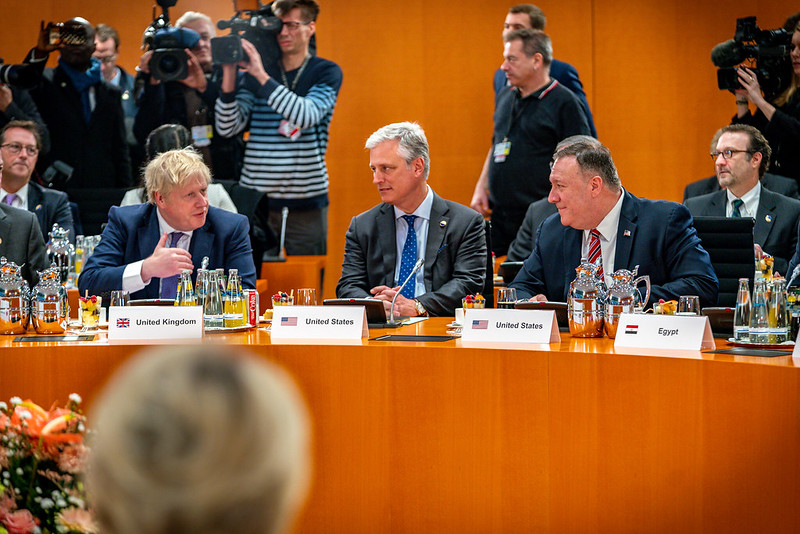The Berlin Conference on Libya: Will Hypocrisy Undermine Results?
International actors committed to not interfere in Libya, but can they be held to it?

Published by The Lawfare Institute
in Cooperation With

Editor’s Note: This article originally appeared on Order from Chaos.
This past weekend’s Berlin Conference on Libya, in explicitly excluding Libyan participation, violated the 2012 United Nations Guidance for Effective Mediation and its insistence on “inclusivity” and “national ownership” as fundamental elements for peaceful conflict resolution. Yet the Berlin Conference’s detailed communiqué, covering a comprehensive range of issues, suggests that German Chancellor Angela Merkel and U.N. Special Representative for Libya Ghasssan Salamé deserve far greater credit than they are likely to receive — including for focusing at this point on the external, rather than the Libyan, actors and for reviving the world’s attention on the Libyan conflict. The conference was consistent with the logic of the three-part action plan Salamé presented for U.N. Security Council endorsement in July: an Eid al-Adha truce, an international conference (e.g. in Berlin), and a Libyan-led process under U.N. auspices.
Berlin symbolizes a crossroads: Either the external actors will implement what they ostensibly committed to do, including abiding by the international arms embargo on Libya (in place since 2011 and renewed annually), or they will again reveal their hypocrisy in supporting resumed fighting.
The Scene in Germany
In Berlin, Merkel and Salamé managed, at least on paper, to cajole the external actors guilty of super-charging Libya’s misery to sign onto a unified agenda. Russia’s Vladimir Putin, Turkey’s Recep Tayyip Erdoğan, France’s Emmanuel Macron, and Egypt’s Abdel Fatah el-Sisi joined a dozen or so others (with Secretary of State Mike Pompeo representing the United States) in declaring an intention to end foreign interference in Libya’s internal affairs: “We commit to refraining from interference in the armed conflict or in the internal affairs of Libya and urge all international actors to do the same,” states the communiqué, in language one hopes all participants endorsed in (what would be uncharacteristic, for some) good faith.
Demonstrating seriousness in terms of follow-up, Salamé and his team developed an operational plan—cleverly annexed to the communiqué (and which was adopted within the communiqué, thus blessed by the participants)—that includes a joint military commission (JMC) to which the two warring sides in Libya have already agreed to deploy representatives. The communiqué also seems to resolve some of the annoying, longstanding, distracting diplomatic friction between the U.N. and the African Union regarding Libya, putting the U.N. front and center. (The Security Council, with African votes, had already done so repeatedly, to the annoyance of Addis. Libya may indeed be an “African” problem, but it is also an Arab, European, and international problem.) Political and economic grievances underlying Libya’s internal disputes, which only the Libyans can resolve, are addressed sensibly.
The Berlin Conference, in short, should be recognized as the most serious attempt in years to address the international factors behind Libya’s woes. And the logic of excluding the Libyans, consistent with Salamé’s July Security Council presentation, stemmed from the reality that the external actors are the ones providing the sophisticated weaponry and drones, mercenaries, and troops that allow each Libyan side to believe it might just overwhelm the other side militarily, obviating the need for hard political compromise.
The primary question, of course, is whether any of this will matter on the ground to Libya’s beleaguered citizenry. The answer rests on what those key external actors, especially those indulging Khalifa Haftar’s bloody fantasy of becoming Libya’s next “dear leader,” do now.
In short, the Libyans face escalation or de-escalation, with the external drivers turning the steering wheel. Unfortunately, the track record of external actors moving toward de-escalation and reining in their Libyan proxies after past international meetings (e.g. in Paris or Palermo) is not promising.
The Libyan Chessboard
At President Putin’s insistence, Fayez Serraj, head of Libya’s internally recognized Government of National Accord (GNA), and Khalifa Haftar, the self-styled head of the putative Libyan National Army besieging Tripoli since April, were both present in the German capital. But, by design, they did not attend the conference nor meet together separately. The Germans and U.N. officials briefed both on the conference’s outcome.
Should they choose, both Serraj and Haftar could cherry-pick from the communiqué and the U.N. operational plan to claim achievements in terms of their stated goals and nudge their supporters to move from a military to a political approach. Serraj seems to be playing along, even if he cannot be comfortable with the implication that eventual political negotiations will lead to his and the GNA’s replacement with a more credible and genuinely representative and inclusive government. But one suspects that Haftar, in particular, will need to feel the full brunt of sustained Russian, Egyptian, Emirati, and French pressure to reconsider his vision of heroically conquering Tripoli by force.
In his rejection of last week’s Russian-Turkish ceasefire proposal (which Serraj accepted), Haftar showed his curious disregard for Moscow, given that Moscow’s deployment of Wagner Group mercenaries in recent weeks gave him a tactical advantage in the battle for Tripoli. Haftar also seems to have missed the opportunity to reduce the momentum for the ongoing Turkish “neo-Ottoman” military build-up in Libya to counter his Russian support, with up to 2,000 Syrian-Turkmen reportedly already on the ground, with thousands more in a potential pipeline.
In choking off Libya’s oil exports (now down to an estimated 72,000 barrels per day, from 1.2 million a week ago) just as participants gathered in Berlin, Haftar demonstrated his disdain for the German-U.N. initiative or any move toward political compromise. Surely, by now, with his multiple “victory within days” proclamations since April, even Haftar’s external supporters recognize that he is not the unifying savior he purports to be. But Egypt and the UAE have, at least until Berlin, viewed him as their best bet against the Islamist bogeymen they associate with the GNA.
For their part, Russia and some African leaders seem to view Haftar as a vehicle for reversing the “humiliation” of the 2011 overthrow of Moammar Gadhafi. Haftar, priding himself on dubious claims of trying to oust Gadhafi even before 2011, is narcissistically blind to the possibility that he is being used by the Russians to restore a Gadhafi-like rule to Libya (perhaps, as has been rumored in conspiracy-minded Tripoli circles, even in the person of Moammar Gadhafi’s son Said).
Washington’s Opportunity
It should be clear within weeks whether the Berlin Conference marks the resumption of a constructive political process or is relegated to a footnote in the annals of Libya’s externally exacerbated post-2011 violence. Despite the details in the something-for-everyone Berlin communiqué, sharp differences in interpretation and priorities between the external actors and their Libyan proxies will quickly surface. To monitor and encourage implementation, the Berlin Conference created an International Follow-Up Committee to meet at the senior officials’ level in monthly plenaries and twice monthly in four technical committees.
To be effective, the follow-up mechanisms need a heavyweight enforcer—typically the United States in a behind-the-scenes role—to ensure seriousness. Yet despite Secretary Pompeo’s participation in Berlin, U.S. Libya policy seems adrift, with Washington seeing Libya as “Europe’s problem.” While supporting opposing sides in the Libya conflict, Turkey and Russia have tried to fill the vacuum created by the U.S. absence. The African Union and the European Union may aspire to do the same.
But the full force of American diplomacy machinery engaged to promote implementation of the Berlin Conference communiqué cannot be replicated by any other single actor. Thanks to Berlin and U.N. leadership, Washington now has a clear blueprint, created by the Berlin Conference, for what the international community should do. In this case, the Trump administration’s heretofore abdication of leadership on Libya can be an asset: Washington, with less direct interests and involvement than other external actors, can be the most effective in promoting implementation.
Given the lack of assured success, the Germans deserve credit for taking a risk in lending the prestige and political weight of Chancellor Merkel to support the U.N.’s mediation efforts to end the Libya conflict. If the external actors fulfill their Berlin commitments, the focus could then shift to the next stage of the U.N.’s proposal for Libya: intra-Libya talks on a basket of issues including security, economics and finance, and political issues. But it is worth remembering that plans for intra-Libyan talks in mid-April provoked Haftar’s decision to attack Tripoli as preferable to dealing with Libyans whose vision for the country differs from his. In other words, it is not sufficient for the external actors to now shift to a merely passive role. They need to use their influence to persuade their Libyan allies to sit down and construct political arrangements to reunify the country.


.jpg?sfvrsn=407c2736_6)


